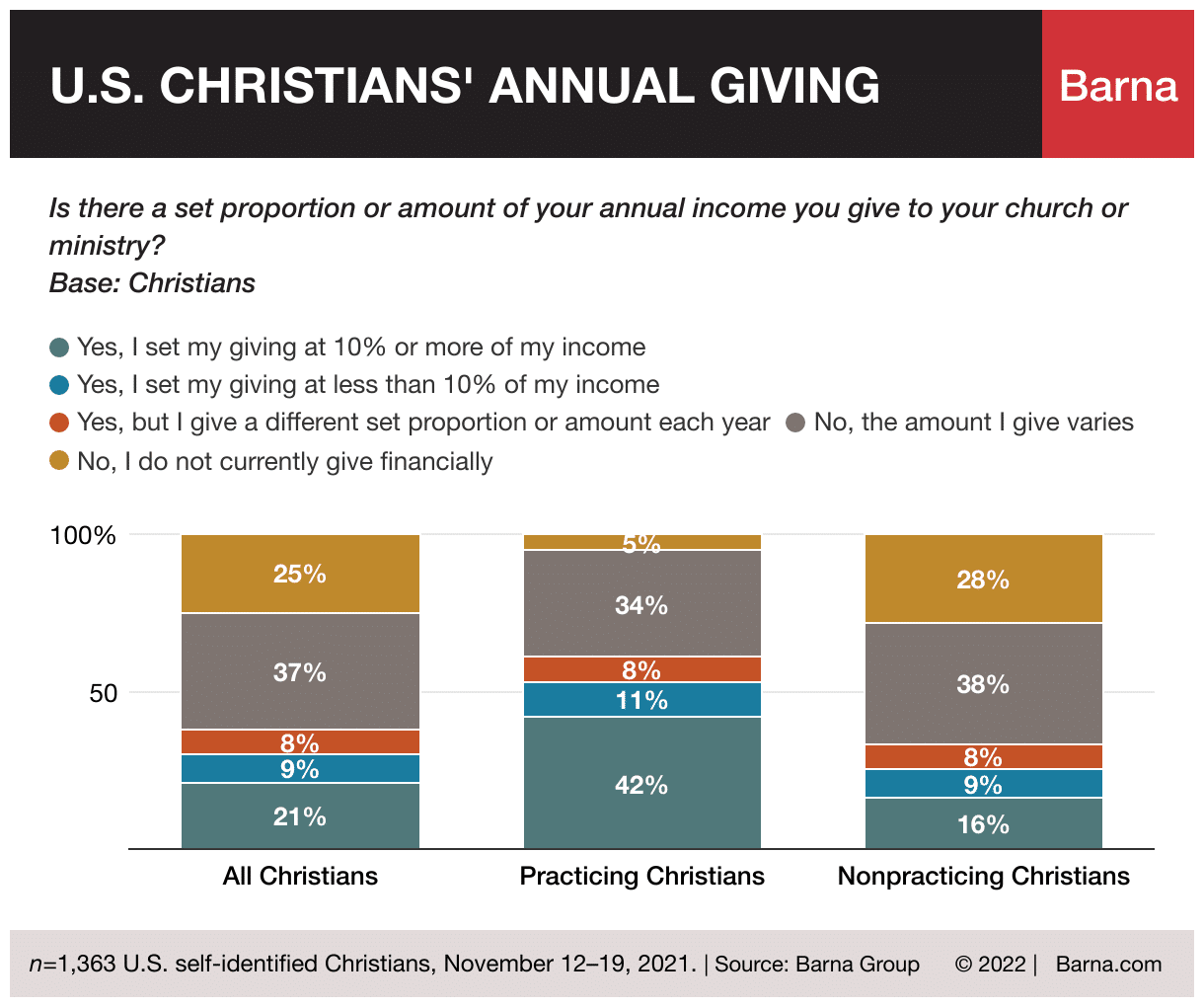Only one in three pastors (33%) believe the traditional 10% tithe should be the standard for their church’s giving, according to a newly released Barna survey.
Drawing from a nationally representative sample of U.S. pastors, Barna reported that 20% of pastors feel congregants should give “enough to be considered sacrificial.” Another 20% say the standard is “as much as they are willing.”
The study also showed a decline in tithing among churchgoing Christians.
It found that 42% of practicing Christians say they give at least 10% of their income to a church or ministry. Four years ago, a Lifeway Research survey found that 54% of churchgoers say they give at least 10% of their income to church.

The data release comes soon after prominent televangelist and Georgia megachurch pastor Creflo Dollar renounced his past decades-long teachings on tithing.
Your tax-deductible gift helps our journalists report the truth and hold Christian leaders and organizations accountable. Give a gift of $30 or more to The Roys Report this month, and you will receive a copy of “Hurt and Healed by the Church” by Ryan George. To donate, click here.
In a late June sermon, Dollar called his past stance that mandated tithing “not correct” and urged congregants to “throw away every book, every tape, and every video I ever did on the subject of tithing.”
Despite the developments, David Croteau, dean of Columbia Biblical Seminary, said he thinks tithing may be here to stay.

“My anecdotal experience is that these beliefs are not necessarily going away,” he told The Roys Report, after reviewing the Barna survey findings. “When I talk to Christians, and even some pastors, they still talk about the tithe as a requirement.”
Barna’s survey revealed that the concept of tithing has become a “hazy concept” for a majority of believers today. Specifically, only 43% of Christians say they are familiar with the term “tithe” and only 22% of Christians can give a specific definition.
Croteau, who has published multiple books and articles on tithing, agrees that many are confused about the topic. “I’ve talked to people with multiple theological master’s degrees from good seminaries who cannot define tithing well,” he said. “Perhaps it’s confusing in part because the English word tithe means ‘tenth,’ but the biblical tithe was not 10%. In the Old Testament, the tithe requirement of land and cattle was over 20%.”
In conversations he has had with pastors, Croteau said he has sometimes heard concerns about giving declines if a church’s teaching shifts from a tithing paradigm.
“Many ministries that have taught against tithing for decades have no problem with financing their church,” he said. “What matters is replacing a tithe mindset with New Testament ‘grace giving’—which is sacrificial, generous, systematic, and consistent. I think the fears are not based in reality.”
 Freelance journalist Josh Shepherd writes on faith, culture, and public policy for several media outlets. He and his wife live in the Washington, D.C. area with their two children.
Freelance journalist Josh Shepherd writes on faith, culture, and public policy for several media outlets. He and his wife live in the Washington, D.C. area with their two children.




















10 Responses
My pastor strongly endorses tithing, even claiming his kid got a college scholarship because he, the pastor, tithes.
I am not sorry, but there’s a reason the young man got the scholarship. It conveniently wasn’t disclosed. And atheists get scholarships, too.
First of all, the Bible DOES NOT instruct Christians to tithe.
But think about it; does the teaching actually work? No, it doesn’t, or there would be zero poor Christians.
My church once gave a tithe mandate, then, changing the subject, showed an Indian church that couldn’t afford to put a roof on their church. Don’t they tithe?
Is tithing fair? Say there are two couples who both make $45,000 a year. One couple has no children, and inherited their house. The other couple has a house payment, and two children.
The same payment of $4500 is going to open up heaven’s blessing? Really?
“My pastor strongly endorses tithing, even claiming his kid got a college scholarship because he, the pastor, tithes. ”
Doesn’t that type of preaching fall under prosperity gospel?
Sounds like it to me!!
I have noticed that even the most ultra-conservative churches whose pastors denounce the prosperity gospel all endorse the same theology during their building campaigns.
Good thoughts John
Thanks for sharing
Isn’t a “Nonpracticing Christian” an oxymoron?
Has anybody asked their pastors if they tithe, where it goes, and what percent of their salary was given? What was their response?
I was a volunteer board member on my daughter’s Christian school – the local mega church pastor “instructed” his “flock” that they should tithe 10% to his building campaigns, etc, instead of using those funds to send their children to a Christian school like ours. MEANWHILE, he got a 100% tuition free education from our school for his kids, while telling his people they shouldn’t spend their money on the same education that he mooched off of us. He’s got a real nice huge building with a teen center full of video games etc, but do they preach the gospel to these kids? NOPE. It’s all about nickels and noses to these heretics. And of course our school had to close because he had bullied all the parents into thinking they didnt need a non-government education, but his building campaigns continue unabated. I think he took a page out of James MacDonalds book – this church is located just down the road from HCA in Elgin.
Kent W B,
What was his response when challenged under Jesus’s teachings and the 10 commandments?
The jury is still out in my mind on tithing. It was strongly suggested as I was growing up in Evangelicalism, but never monitored, enforced, or guilt-tripped. No promises were ever made in exchange for tithing in the churches or groups I found myself in.
I think that is the way it should be. Let a person’s conscience guide them. Doubtful actions about it are sinful.